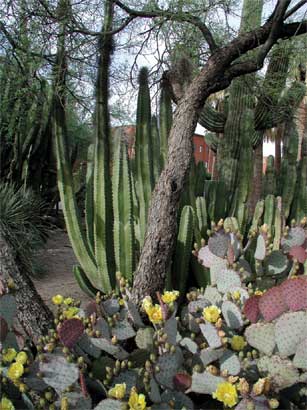|
The University Of Arizona College of Agriculture and Life Sciences | |
|
We attempt each year to identify a series of articles that will give a broad overview of the research activities in the College of Agriculture and Life Sciences. This year’s topics range from genomics to economics, from commodities to sun protection, from safety issues to environmental concerns, and from rural to urban problems. The story on perchlorate contamination in the Colorado River and possible uptake by crops grown with this water reveals the first information on this issue but I am certain it will not be the last. There is also a featured article on soil remediation, another environmental issue that will be with us for many years. Vegetables, cotton and cattle are the major commodities in this state. We have included information on all of these and more. Our plant scientists lead the nation with their work on plant genomics. Appropriately, we have included some of this work in addition to articles on safety, consumer issues, and human and natural resources. I want to express my appreciation to the faculty and staff who developed the information and to our production staff, Susan McGinley, Robert Casler, Maria del Carmen Aranguren and Joanne Littlefield, who have again exceeded expectations with the content and layout. As always, please contact us or the individual faculty listed at the end of each article if you have questions or comments. We attempt each year to identify a series of articles
that will give a broad overview of the research activities in the
College of Agriculture and Life Sciences. This year’s topics
range from genomics to economics, from commodities to sun protection,
from safety issues to environmental concerns, and from rural to urban
problems.
The story on perchlorate contamination in the Colorado River and possible uptake by crops grown with this water reveals the first information on this issue but I am certain it will not be the last. There is also a featured article on soil remediation, another environmental issue that will be with us for many years. Vegetables, cotton and cattle are the major commodities in this state. We have included information on all of these and more. Our plant scientists lead the nation with their work on plant genomics. Appropriately, we have included some of this work in addition to articles on safety, consumer issues, and human and natural resources. I want to express my appreciation to the faculty and staff who developed the information and to our production staff, Susan McGinley, Robert Casler, Maria del Carmen Aranguren and Joanne Littlefield, who have again exceeded expectations with the content and layout. As always, please contact us or the individual faculty listed at the end of each article if you have questions or comments. Colin Kaltenbach A Vision of the College of Agriculture and Life Sciences in Arizona's Agricultural Future 2003–2013 In 1985 the University of Arizona College of Agriculture
undertook a comprehensive two-year assessment of Arizona agriculture,
culminating in a 1986 report that characterized the role of agriculture
in Arizona and in the marketplace, forecasted the challenges and needs
facing Arizonans as a result of changes in agriculture, identified
scientific, technological, and institutional develops to meet our
future needs and provided recommendations for action by the state,
agribusiness, and Arizona’s universities. | |
|
The University of Arizona is an Equal Opportunity/Affirmative
Action Employer. Any products, services, or organizations that are mentioned,
shown, or indirectly implied in this publication do not imply endorsement
by the University of Arizona. |
